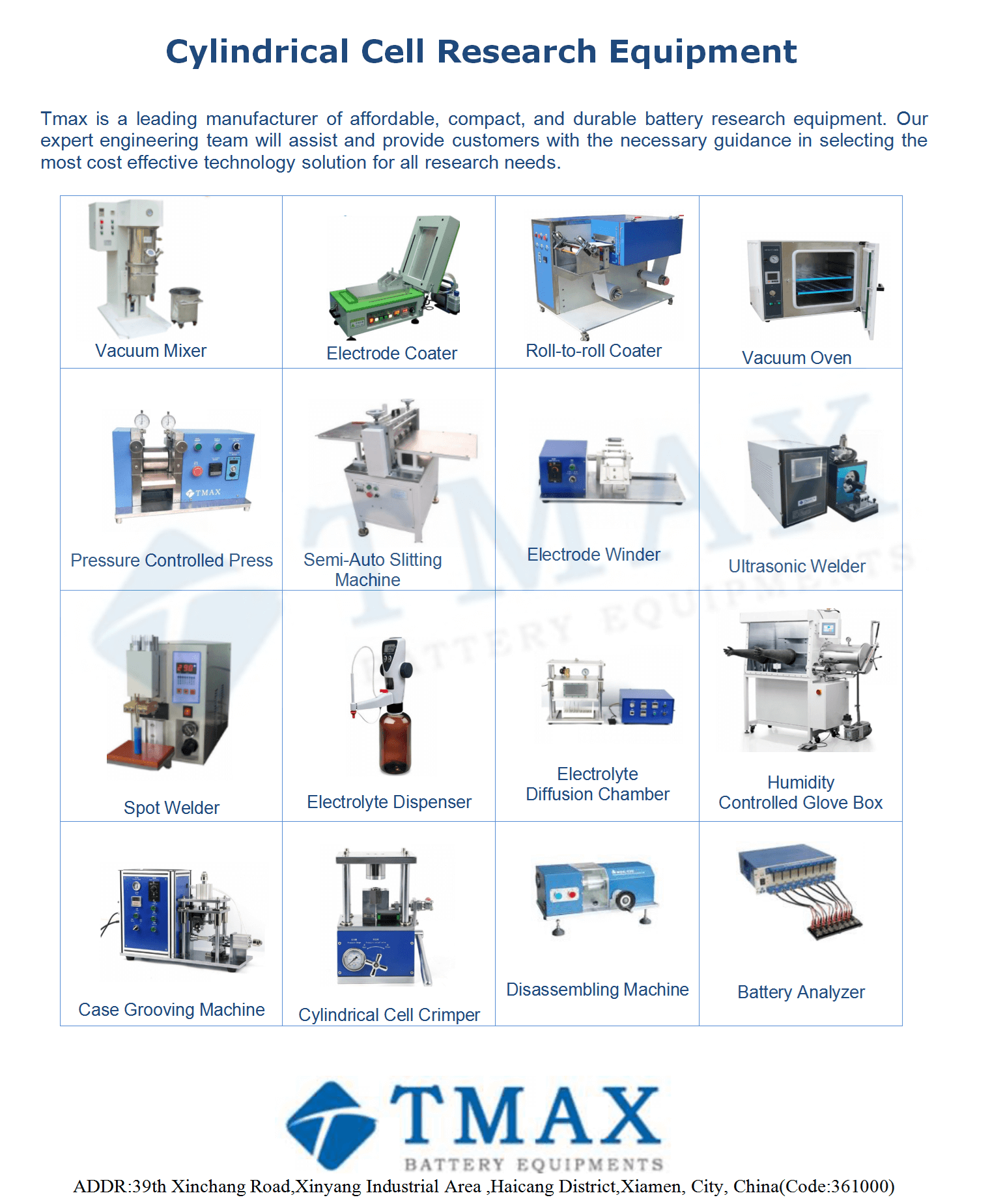- Battery Manufacturing Equipment
- Battery Laboratory Assembly Equipment
- Battery Pack Assembly Equipment
- Sodium Ion Battery Manufacturing Equipment
- Solid State Battery Assembly Line
- Dry Electrode Assembly Equipment
- Supercapacitor Assembly Equipment
- Perovskite Solar Cell Lab Equipment
- Li ion Battery Materials
- Ni / Al / Cu Metal Foam
- Customized Electrode
- Cathode Active Materials
- Anode Active Materials
- Coin Cell Parts
- Lithium Chip
- Cylindrical Cell Parts
- Battery Current Collectors
- Battery Conductive Materials
- Electrolyte
- Battery Binder
- Separator and Tape
- Aluminum Laminate Film
- Nickel Strip/Foil
- Battery Tabs
- Graphene Materials
- Cu / Al / Ni / Stainless steel Foil
- Battery Laboratory Equipment
- Li ion Battery Tester
- Battery Safety Tester
- Battery Material Tester
- Film Coating Machine
- Rolling Press Machine
- Electrode Mixer
- Coin Cell Crimping Machine
- Coin Cell Electrode Disc Punching
- Pouch Cell Sealing Machine
- Pouch Cell Stacking Machine
- Pouch Cell Forming Machine
- Pouch Cell Ultrasonic Welder
- Pouch Cell Electrode Die Cutter
- Cylinder Cell Sealing Machine
- Cylinder Cell Grooving Machine
- Electrode Slitting Machine
- Cylinder Cell Winding Machine
- Cylinder Cell Spot Welding Machine
- Electrolyte Filling
- Type Test Cell
- Other Battery Making Machine
- NMP Solvent Treatment System
- Vacuum Glove Box
- Lab Furnaces
- Ball Mill
- Hydraulic Press
- Laboratory Equipment
- 2024-01-18
A cylindrical cell research plant is a facility designed for the research, development, and testing of cylindrical lithium-ion battery cells. Cylindrical cells are a common form of lithium-ion batteries, often used in various applications such as electric vehicles, portable electronics, and energy storage systems. Here are some typical features and applications of a Cylindrical Cell fabrication Plant:
1. Research and Development:
Cell Design Optimization: The plant serves as a platform for optimizing the design of cylindrical cells, including electrode materials, electrolytes, and overall cell architecture.
Innovative Technologies: Researchers can explore and implement innovative technologies to enhance the performance, safety, and energy density of cylindrical cells.
2. Performance Testing:
Cycle Life Testing: Evaluating the longevity of cylindrical cells under different charging and discharging conditions to understand their cycle life.
Rate Capability: Assessing the ability of cylindrical cells to deliver and absorb power at various rates, crucial for applications with dynamic power demands.
3. Safety Testing:
Thermal Management: Studying thermal management strategies to ensure the safe operation of cylindrical cells, especially under extreme conditions.
Abuse Testing: Simulating and analyzing potential abuse scenarios, such as overcharging, over-discharging, and external impacts, to improve the safety features of cylindrical cells.
4. Material Characterization:
Electrode Material Studies: Investigating the characteristics and performance of electrode materials, including anode and cathode materials.
Separator Optimization: Exploring different separator materials to enhance the overall performance and safety of cylindrical cells.
5. Scale-up Studies:
Scalability Assessment: Assessing the scalability of manufacturing processes from research and development to larger-scale production.
Production Process Refinement: Refining and optimizing production processes to ensure efficiency, consistency, and cost-effectiveness.
6. Quality Control:
Consistency Testing: Implementing quality control measures to ensure the consistency of cylindrical cell production.
Defect Analysis: Investigating potential defects and irregularities in the manufacturing process to improve product quality.
7. Customized Cell Development:
Application-Specific Cells: Developing cylindrical cells tailored for specific applications, such as electric vehicles, consumer electronics, or grid storage.
Customer Requirements: Addressing customer-specific requirements by customizing the design and performance characteristics of cylindrical cells.
8. Environmental Impact Assessment:
Sustainability: Evaluating and incorporating sustainable and environmentally friendly practices in the manufacturing processes of cylindrical cells.
9. Prototyping and Market Testing:
Small-Scale Production: Producing small batches of cylindrical cells for prototyping and market testing.
Customer Feedback: Gathering feedback from early users and customers to refine and improve cylindrical cell designs.
A Cylindrical Cell Assembly line is instrumental in advancing the technology, performance, and safety of lithium-ion batteries, contributing to the evolution of energy storage systems and electronic devices.
-
 Automatic Cylinderical Battery Electrode Winding Machine
Read More
Automatic Cylinderical Battery Electrode Winding Machine
Read More
-
 100-200L Double Planetary Vacuum Mixing Machine for Lithium Battery Slurry
Read More
100-200L Double Planetary Vacuum Mixing Machine for Lithium Battery Slurry
Read More
-
 Large Heating Roller Press Machine Calender For Li ion Battery Production Line
Read More
Large Heating Roller Press Machine Calender For Li ion Battery Production Line
Read More
-
 Large 3 Rollers Battery Electrode Film Intermittent Coating Machine for Pilot Production Line
Read More
Large 3 Rollers Battery Electrode Film Intermittent Coating Machine for Pilot Production Line
Read More
-
 512 Channel 5V3A Battery Grading Machine/Battery Charge Discharge Machine Tester
Read More
512 Channel 5V3A Battery Grading Machine/Battery Charge Discharge Machine Tester
Read More
 ru
ru


 cindy@tmaxcn.com
cindy@tmaxcn.com David@battery-equipments.com
David@battery-equipments.com Wechat:13506084915
Wechat:13506084915